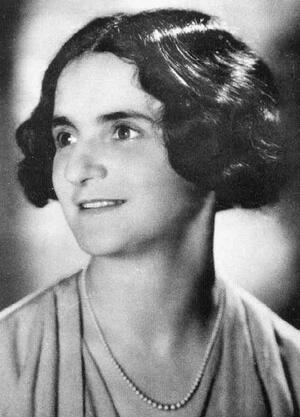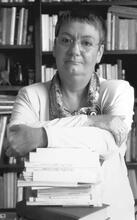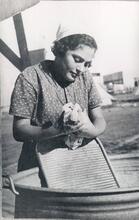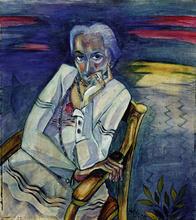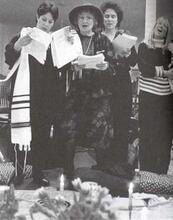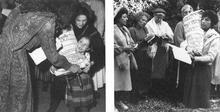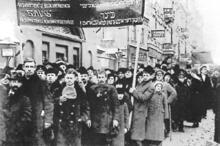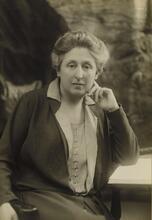Toni Sender
A passionate pacifist and socialist, German Toni Sender (shown here in 1928) sought to harness the active participation of women to achieve social transformation. She continued the struggle for women's rights after immigrating to the U.S., where she ultimately returned to the Jewish tradition she abandoned at age 13.
Institution: Universität Ulm, Germany
Toni Sender began calling herself a dissident at thirteen and by sixteen was a member of the Union of Clerical Workers. After moving to Paris in 1910, she joined the Socialist Party and formed a women’s group to break down social and economic barriers to equality. She participated in an unprecedented women’s international anti-war congress in 1915 and helped found Germany’s Independent Social Democratic Party (USPD). In 1920 she was elected to the German Reichstag for the USPD and from 1924 to 1933 served in Parliament. After fleeing to the United States in 1933, she joined the board of the German American Council for the Liberation of Germany from Nazism, and after 1944 became active with the United Nations in slave labor and displaced persons issues, retiring in 1956.
Early Life
At the age of thirteen, impelled by an uncontrollable urge for freedom, Sidonie Zippora Sender (who later called herself Toni), left her parental home in Biebrich, Rhineland, to attend a commercial college for girls in Frankfurt am Main. Born on November 29, 1888, she was the third daughter of Moritz Sender, a businessman who served as president of the Jewish community, and Marie, née Dreyfus, both orthodox Jews. After leaving home Toni referred to herself as a “dissident.” Eager to continue her education, she took evening courses and attended lectures on politics and literature, but her father denied her the necessary permission to enable her to study economics. She participated in demonstrations for universal suffrage and experienced police violence. As a sixteen-year-old she began work as an office girl and joined the Union of Clerical Workers.
Political Work in Germany
In 1910, after working for seven years as a clerk for a furniture firm in Frankfurt, she transferred to a metal firm and for the next four years worked at its Paris branch. Here she joined the Socialist Party, became the second chairperson of a party district branch, and was profoundly fascinated by Jean Jaurès. Together with others, she formed a women’s group that aimed to free married women of their economic dependency and from political and social discrimination. She was convinced that without the active participation of women there could be no profound social transformation. She was not a suffragist; rather, she was an activist who wished, independently of men, to change the world with the help of her party. She participated in public meetings during the French election campaign and called for international disarmament and unity between nations. The assassination of Jaurès and the outbreak of World War I brought an end to her stay in France.
Returning to Frankfurt, she sought contact with members of the German peace movement; she had left the SPD (Sozialdemokratische Partei Deutschlands) because of its support for the war. One of those who had opposed the party line was Robert Dissman, with whom she felt a close affinity. In 1915, she participated in the international congress of women organized by Clara Zetkin, which was the first international anti-war congress. In 1917 she was among the founding members of the USPD and during the November revolution became general secretary of the executive committee of the Council of Workers and Soldiers in Frankfurt am Main. In 1919 she was elected a member of the municipal council and in the same year took on the editorship of the USPD’s daily newspaper, Volksrecht (Citizens’ Rights).
Beginning in 1920, Toni Sender served in numerous positions within the party, including that of publisher and editor-in-chief of Frauenwelt (Women’s World) from 1927 on. In 1920 she was elected to the German Reichstag, first as a representative of the USDP and then, after the parties’ reunification in 1922, for the SPD, serving as spokesperson on economic issues and foreign policy. A member of the left wing in the SPD, she was one of the most determined parliamentary opponents of national-socialism and radical Communism and one of the first to object to right-wing radicalization. As a result, antisemitic articles claimed that her identification as a “dissident” was actually a way of concealing her Jewish origins.
Severe tuberculosis compelled her to take a year’s leave from politics, which she spent in Switzerland. In 1924 she was elected a member of parliament for the Dresden-Bautzen constituency, holding the seat until 1933.
During and After Nazi Rule
On March 5, 1933, shortly after the burning of the Reichstag, Toni Sender emigrated via Czechoslovakia and Belgium to the United States, which she had already twice visited and which seemed to offer her an opportunity for personal and political freedom. She lectured on national socialism, called for a democratic “people’s front” against fascism and wrote articles for Aufbau, the German-language publication of German-Jewish emigrants, and other publications. She also turned to Judaism, involving herself in Jewish organizations and initiatives and offering practical assistance to the persecuted Jews of Germany. In 1941 she became a board member of the social-democratic German American Council for the Liberation of Germany from Nazism and also joined the Association of Free Germans. Ten years after immigrating she was naturalized an American citizen. From 1944 on, Toni Sender was active in numerous United Nations commissions, particularly the Commission on the Status of Women. She became an economic expert at the UN Relief and Rehabilitation Administration (UNRRA). Her major areas of interest and activity were slave labor and support for Displaced Persons in post-war Europe. In 1947, sent to Geneva as a representative of the American Federation of Labor, she also visited the West German Zone, where social democrats perceived her as an “American” rather than an anti-fascist. In Frankfurt, however, she was considered a “renowned representative of democratic ideals.”
Later Life
Beginning in 1950 she represented the AFL, an accredited non-governmental organization, at the United Nations. Since the male members of the unions were still prejudiced against equal rights for women, she called on the latter to become involved, like the women of the generation “who had fought with fearless courage for the right to vote.”
In 1952 she fell ill, but continued her work at the AFL until 1956. In the last years of her life Toni Sender became more religious and was active in the Jewish community. After her death of a stroke in New York on June 22, 1964, she was buried at the Conservative Beth Israel Cemetery in Woodbridge, New Jersey.
Because Toni Sender maintained that it was in Frankfurt am Main that she experienced her initial political impulse and spent the decisive formative years of her political development, the city has since 1992 awarded a biennial Toni Sender Prize to women who have made an outstandingly innovative contribution to the implementation of equal rights for women and to the fight against gender discrimination.
Selected Works
Women and the Tax System. Berlin: 1919.
Dictatorship and the Proletariat, or Dictatorship of the Proletariat. Frankfurt am Main: 1920.
A Broad Coalition?: Against a Union with Heavy Industry. Frankfurt am Main: 1923.
Autobiography of a German Rebel. New York: 1939 (German edition: Frankfurt am Main: 1981).
Tony Sender, 1888–1964: Rebel, Democrat, World Citizen. Published by the Historical Museum of Frankfurt am Main: 1992.
Lexikon Jüdische Frauen. Edited by Jutta Dick and Marina Sassenberg.

